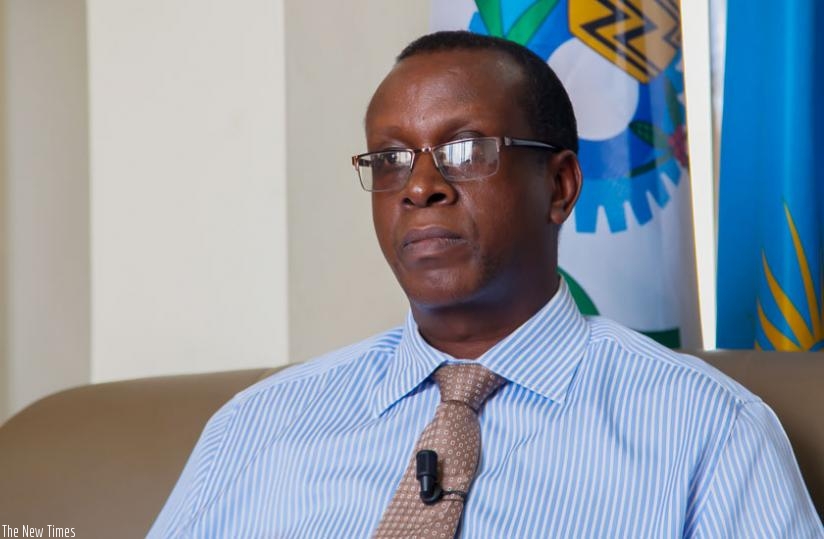The Appeals Chamber of the International Criminal Tribunal for Rwanda (ICTR) has, for long, not only set free Genocide convicts before they finished their sentences, but also harbored a “hidden agenda” and continues to manifest a propensity to deny the 1994 Genocide against the Tutsi.


The Appeals Chamber of the International Criminal Tribunal for Rwanda (ICTR) has, for long, not only set free Genocide convicts before they finished their sentences, but also harbored a "hidden agenda” and continues to manifest a propensity to deny the 1994 Genocide against the Tutsi.
The observation was made by Jean Damascène Bizimana, the executive secretary of the National Commission for the Fight against Genocide (CNLG), a day after the tribunal’s appeals chamber trimmed down the life sentences earlier imposed by the Trial Chamber on three Genocide convicts and set two others free.
Speaking to The New Times, yesterday, Bizimana said he was not unmindful of the tribunal’s positive accomplishments, including recognising the Genocide against the Tutsi, but hauled the coals over its Appeals Chamber for "numerous” grave mistakes when it came to dispensing justice.
"During the course of many cases, the Appeals Chamber showed inclination to minimise the Genocide against the Tutsi. It worked to exonerate many of the planners and perpetrators of the Genocide and at the same time lessen their sentences,” Bizimana said.
"There are also cases of Genocide convicts being set free before they could serve out their prison time. All these are things the CNLG condemns. Look at the many examples, including the recent one of [Pauline] Nyiramasuhuko.”
On Monday, the Appeals Chamber reduced the life sentences previously imposed by the Trial Chamber on six appellants, including former family affairs minister Pauline Nyiramasuhuko, her son Arsène Ntahobali, and former mayor of Muganza Elie Ndayambaje, to 47 years imprisonment for each of them.
The Appeals Chamber ruled that having considered the impact of its findings on appeal, in particular that the six appellants’ right to be tried without undue delay had been violated.
The trial of the six started in June 2001, becoming the longest and costliest in the history of international justice by the time of ruling in 2011.
For Sylvain Nsabimana, Alphonse Nteziryayo, and Joseph Kanyabashi, the Appeals Chamber found errors in the Trial Chamber’s determination of their respective sentences, and reduced Nsabimana’s sentence to 18 years, Nteziryayo’s to 25 and Kanyabashi’s to 20 years in prison.
However, considering time already served, the Appeals Chamber ordered Nsabimana and Kanyabashi’s immediate release.
CNLG explains stance
Highlighting several examples to illustrate CNLG’s stance, Bizimana said Protais Zigiranyirazo was later exonerated based on testimonies by his nephews – children of ex-president Juvenal Habyalimana, whose leadership set the stage for the massacre of more than one million people – yet he had already been convicted for 20 years.
Zigiranyirazo, aka Monsieur Zed, was a businessman and politician – former governor of the then Ruhengeri Prefecture in northwestern Rwanda. He was initially charged with two counts of crimes against humanity in 2001.
The Trial Chamber in December 2008 convicted him of genocide and extermination as a crime against humanity and sentenced him to 20 years.
However, in November 2009, the verdict was overturned by the Appeal Chamber that acquitted him of all charges and ordered his immediate release, citing errors in initial judgement.
Also, Theoneste Bagosora, a key military organiser of the massacre of the Tutsi, had his sentence reduced from life to 35 years by appeal judges. He was a member of ‘Le Clan de Madame’ or the akazu, an inner group associated with former First Lady Agathe Habyarimana, who was at the nexus of the Genocide ideology.
In the same shade, the convictions of former ministers Justin Mugenzi and Prosper Mugiraneza were overturned in 2013. The duo had been convicted by Trial Chamber II and sentenced to 30 years in prison for conspiracy to commit and direct and public incitement to commit genocide.
"What CNLG sees is a plan by the ICTR Appeal Chamber to minimise the 1994 Genocide against the Tutsi and promote denial,” Bizimana added.
Those released before finishing their sentences include Georges Ruggiu, one of the presenters of Radio Mille Collines, a radio station that played a key role in inciting the public to kill the Tutsi.
On April 21, 2009, the Italian-Belgian journalist was granted early release by an Italian court in violation of the Statue of the ICTR.
editorial@newtimes.co.rw


